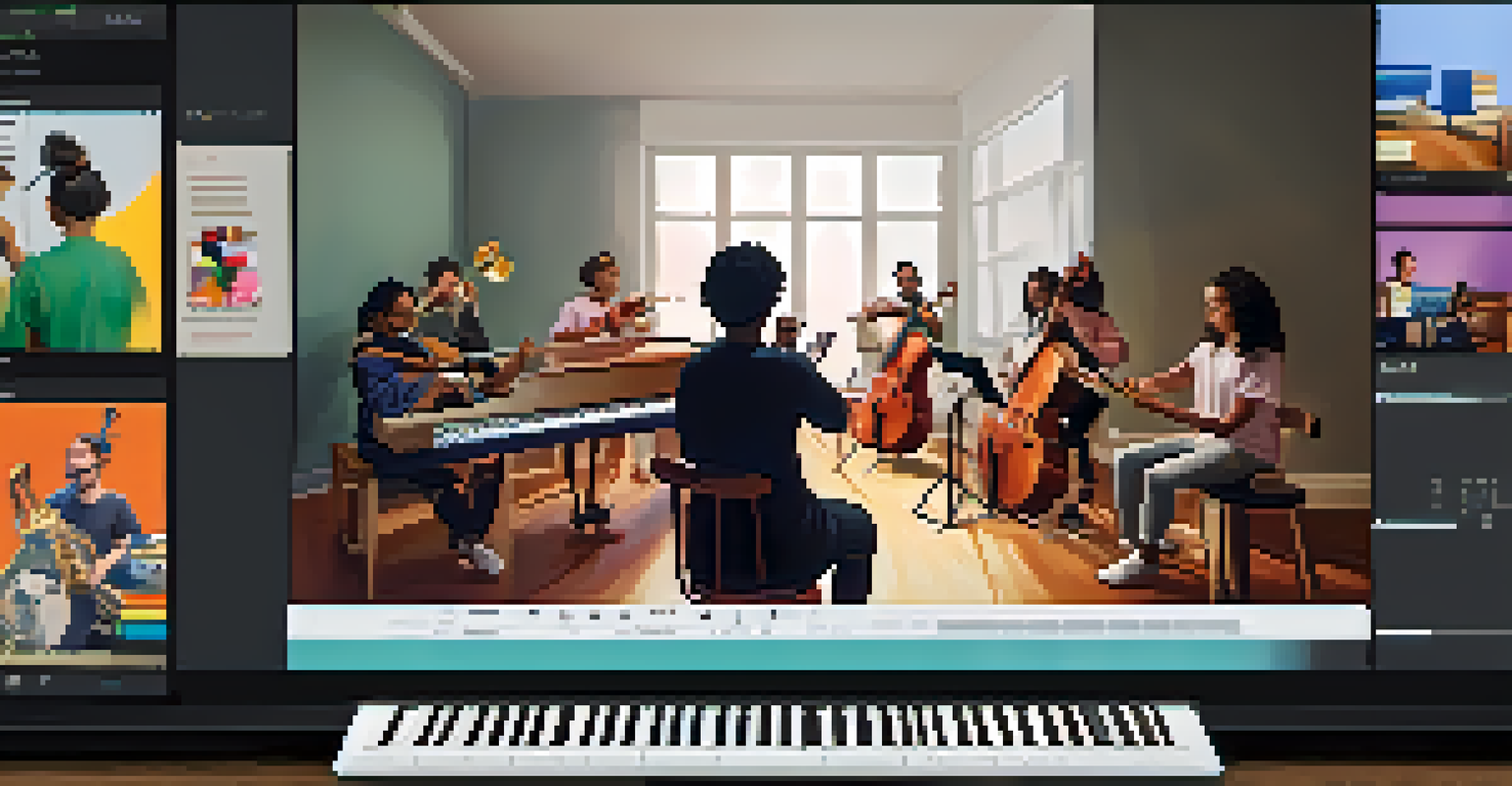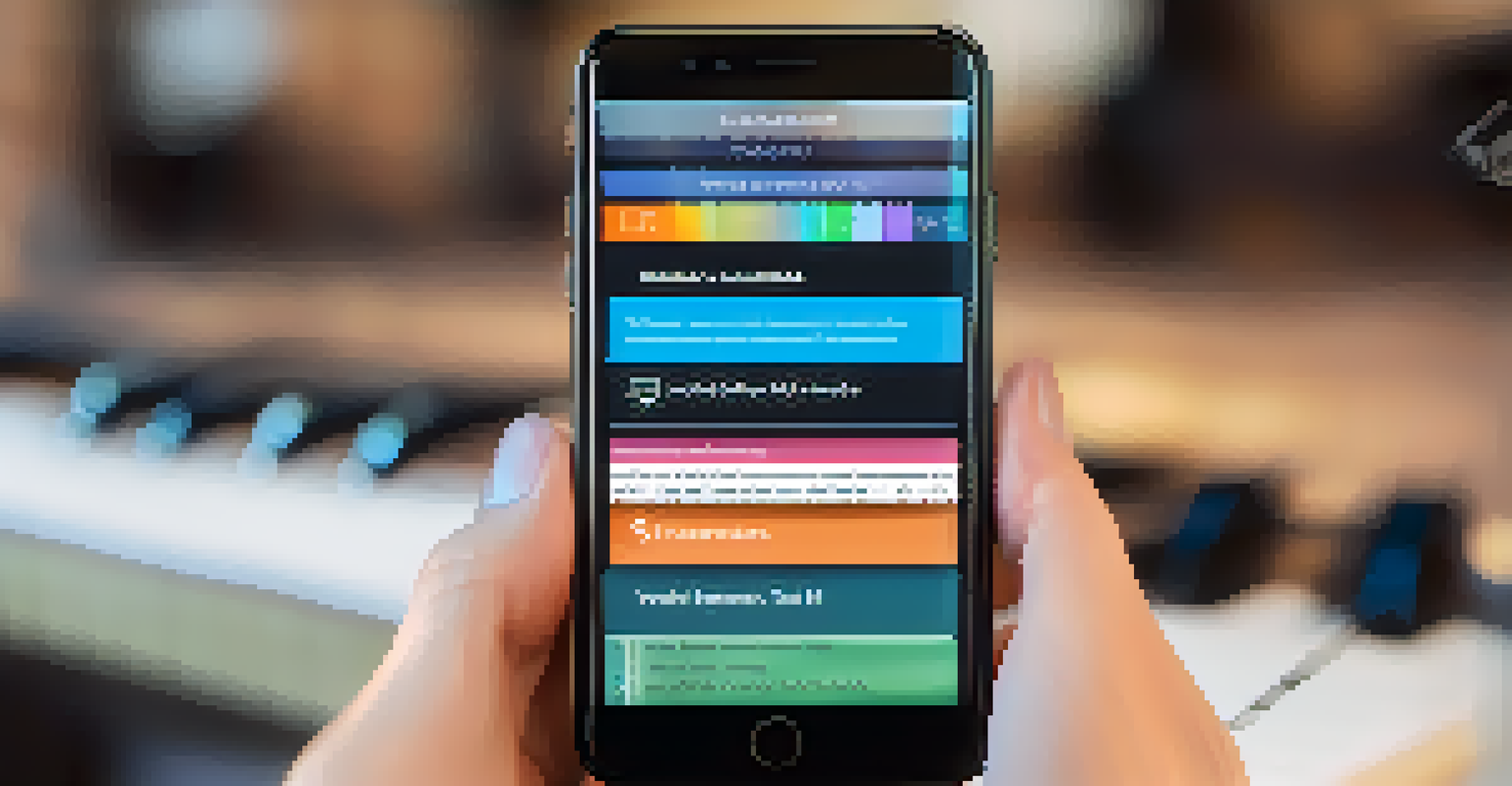Online Platforms: Expanding Access to Music Education Tools

The Rise of Online Music Education Platforms
In recent years, online music education platforms have surged in popularity. These platforms offer diverse resources, from video tutorials to interactive courses, making music learning more accessible than ever. This shift allows aspiring musicians from various backgrounds to explore their passion without the constraints of traditional education.
Music education should be accessible to everyone, regardless of their background or location.
Imagine a teenager in a rural area, dreaming of learning the guitar but lacking local instructors. Online platforms bridge that gap, providing expert guidance through videos and live sessions. This democratization of music education means that talent can flourish, regardless of geographical limitations.
As technology continues to evolve, the tools available for music education are becoming increasingly sophisticated. Features such as virtual classrooms, real-time feedback, and community forums foster a supportive learning environment. This evolution is transforming the way we approach music education, making it an exciting time for learners.
Diverse Learning Tools for Every Musician
One of the most significant benefits of online platforms is the variety of learning tools they offer. From sheet music libraries to rhythm training apps, musicians can find resources tailored to their specific needs. This personalization enhances the learning experience, allowing individuals to progress at their own pace.

For instance, a beginner pianist might start with simple tutorials on music theory and gradually advance to complex compositions. Meanwhile, a seasoned guitarist can explore advanced techniques through masterclasses. This flexibility ensures that every musician, regardless of skill level, can find the right tools for their journey.
Accessibility of Music Education
Online platforms have made music education more accessible, allowing aspiring musicians to learn from anywhere, regardless of geographical limitations.
Moreover, many platforms incorporate gamification elements, such as earning badges or competing in challenges. This not only makes learning fun but also motivates students to stay engaged. The mix of serious study and enjoyable challenges creates a balanced and effective educational experience.
Accessing Expert Instructors Anytime, Anywhere
Online music platforms connect students with expert instructors from around the world. This global access means learners can find the right teacher for their style and needs, whether it's classical, jazz, or pop. The convenience of scheduling lessons at any time adds to the appeal, accommodating even the busiest of lifestyles.
The beautiful thing about learning is that no one can take it away from you.
Picture a budding singer in a small town who dreams of learning jazz vocals. Through an online platform, they can take lessons from a renowned instructor based in New York City. This access to expertise not only enhances their skills but also inspires confidence in their musical journey.
Furthermore, many instructors offer personalized feedback on performances, which is invaluable for growth. This one-on-one interaction is a game changer, allowing students to receive tailored advice that can help them progress more rapidly. The combination of expert guidance and flexible scheduling empowers musicians to reach their goals.
Community Connection: Learning Together
Another fantastic aspect of online music education is the sense of community it fosters. Many platforms feature forums, discussion groups, and social media integrations, allowing students to connect with fellow learners. This exchange of ideas, experiences, and encouragement creates a supportive environment that enhances the learning process.
Think of it as a virtual band where everyone shares their musical journeys. Students can discuss challenges, share tips, and celebrate each other's successes. This camaraderie not only makes learning more enjoyable but also helps build lasting friendships.
Diverse Learning Tools Available
The variety of personalized learning tools and resources offered by online platforms caters to musicians of all skill levels.
Additionally, community challenges and collaborations can lead to exciting opportunities, such as virtual performances or group projects. These shared experiences enrich the educational journey, proving that learning music can be as much about relationships as it is about skills.
Affordable Music Education for All
Traditionally, music education can come with a hefty price tag, from private lessons to expensive instruments. However, online platforms are changing that narrative by offering affordable options that cater to a wider audience. Many provide free resources, while others offer subscription models that fit various budgets.
This affordability means that more people can explore their musical interests without financial strain. A student who might have never considered taking lessons due to cost can now access top-notch resources for a fraction of the price. The result is a more diverse pool of musicians, enriching the music community as a whole.
Moreover, some platforms even offer scholarships or financial aid for those in need. This commitment to accessibility ensures that talent is not limited by economic circumstances, allowing anyone with passion and drive to pursue their musical dreams.
Innovative Technology Enhancing Learning Experiences
As technology advances, so too does the potential for innovative music education tools. Online platforms are integrating features like augmented reality (AR) and artificial intelligence (AI) to enhance the learning experience. For example, AR can help students visualize musical concepts in a more interactive way, while AI can provide personalized practice recommendations.
Imagine practicing your guitar with an app that analyzes your playing in real-time and suggests areas for improvement. This immediate feedback allows for targeted practice, making the learning process more effective. The incorporation of these technologies is redefining traditional methods and offering exciting new ways to learn.
Community and Support Networks
Online music education fosters a sense of community, connecting learners with peers and instructors for support and collaboration.
Furthermore, the rise of virtual reality (VR) could take music education to the next level by creating immersive environments for practice. Whether it’s jamming with a virtual band or performing in a simulated concert, these experiences can build confidence and skill in ways traditional methods cannot.
Challenges and Limitations of Online Music Education
Despite the numerous advantages, online music education platforms do face challenges. One significant concern is the lack of hands-on guidance that in-person lessons provide. While video tutorials and virtual feedback are helpful, some students may struggle without the immediate physical presence of an instructor.
Additionally, the abundance of online resources can be overwhelming for beginners. With countless platforms available, it can be difficult to determine which one is right for individual needs. This information overload may lead to frustration, making it essential for learners to do their research.

Lastly, not all students thrive in an online learning environment. Some may find it difficult to stay motivated or engaged without the structured setting of a classroom. Recognizing these challenges can help both educators and students find the right balance between online and traditional music education methods.
The Future of Music Education Online
Looking ahead, the future of online music education appears promising. As technology continues to develop and evolve, we can expect even more innovative tools and resources aimed at enhancing the learning experience. With constant updates and improvements, online platforms will likely adapt to meet the changing needs of students.
Moreover, the ongoing popularity of online education suggests that it will remain a staple in the music world. Hybrid models that combine traditional and online methods could emerge, providing the best of both worlds. This adaptability will ensure that music education remains relevant and accessible to future generations.
In conclusion, online platforms have revolutionized music education, making it more inclusive and diverse. As we embrace these changes, the potential for nurturing the next wave of talented musicians is limitless, paving the way for a vibrant and dynamic music community.